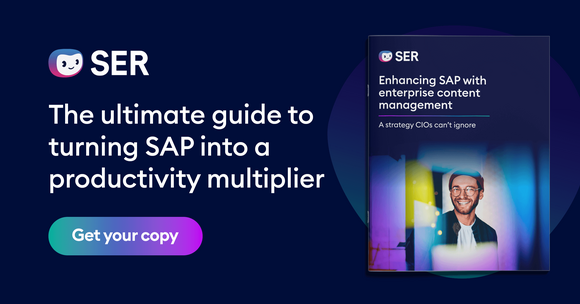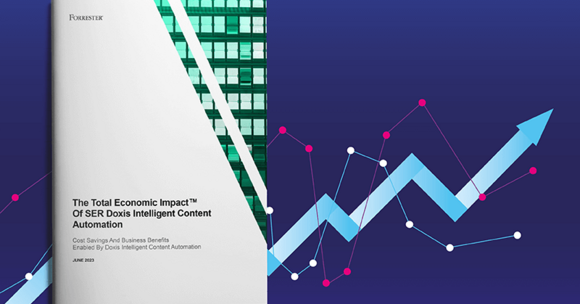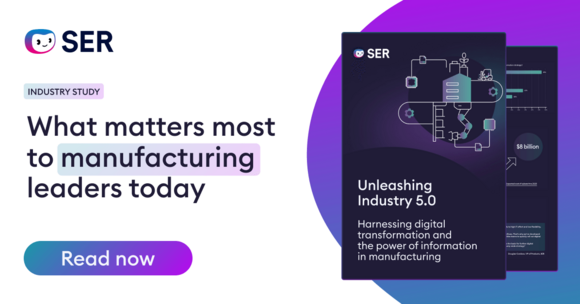SER Blog Customer Stories & Use Cases
AI in production: How industry is changing
Industry 4.0 has fundamentally changed production processes: since then, artificial intelligence (AI) has started to impact entire value chains – everything is suddenly automated. AI-controlled robots manufacture whole assemblies, equipment performs quality controls during production, and thanks to machine learning, systems are optimizing themselves.
The importance of artificial intelligence in production is undeniable: by networking processes with each other, it makes daily work in production more efficient and, most importantly, more advanced.
Find out in this article about the roles that AI technologies are playing in production today and learn about their future. Read about use cases and opportunities here.
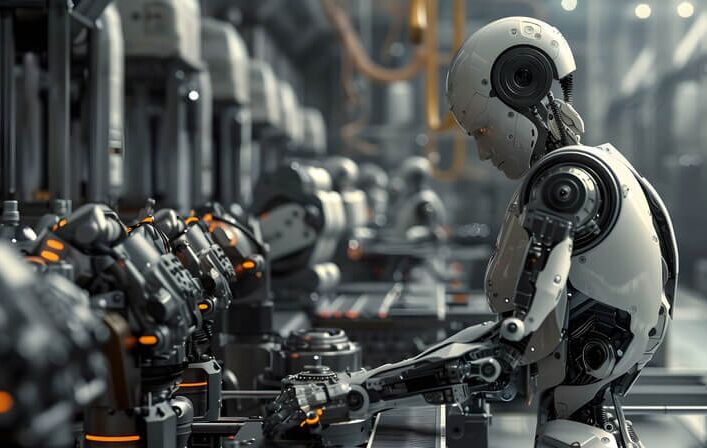
Challenges when using AI
Industrial companies in Germany know that artificial intelligence holds tremendous potential for businesses in the industrial sector. Seventy-eight percent describe AI in production as a critical technology for the future, according to a recent Bitkom study. Nevertheless, many businesses are hesitating to actually use AI in industrial applications. Here are some of the main reasons:
Lack of use cases
Almost half of German industrial companies have decided to first watch from the sidelines. They want a clear use case instead of taking a leading role themselves and transforming their processes. One reason for this is that many businesses in the private sector still do not have the information base to even develop use cases.
Lack of skilled workers
The workers needed to drive developments are also in short supply. Due to the shortage of skilled workers, important expertise gets lost in a business and gaps in knowledge develop. If questions on issues such as data protection remain unanswered, the barrier to using AI increases.
At the same time, work processes are delayed, if a business doesn’t have enough employees. Specialists need time to develop workflows using AI and integrate them in their organizations. This is time they do not have.
Lack of trust
As long as there is a lack of use cases and valid data sets on AI technologies, industrial companies are not going to fully trust in the visionary possibilities offered by AI. For many Germans, it is a utopia that AI will carry out quality controls, optimize energy consumption, or support employees with real-time instructions through augmented reality.
Lack of flexibility
The German legal system also makes it difficult for companies to integrate AI in process optimization activities in industrial workflows. There is particular concern that politicians could immediately stifle the latest opportunities in the AI environment through over-regulation.
Start small, think big: The basis for AI processes
Rarely does a business find itself in the ideal position of being able to implement AI processes at the push of a button. Processes have to first be digitized in order to be able to consider AI solutions. Many businesses are at one of the following two points: their processes and information are either not yet digitized or not yet meaningfully and holistically developed.
If this information base is missing, it is impossible for AI to make forecasts about inventory levels, space, and costs. For this reason, it is important for your business to start small and think big along the way: first comes digitalization, then artificial intelligence.
In other words:
-
The basis for artificial intelligence in industry is an end-to-end database covering all the business processes.
-
Make sure this database is available in a cloud solution.
-
Then you can start to gradually enhance applications and processes with AI.
-
Only at the end do you integrate AI in all your processes.
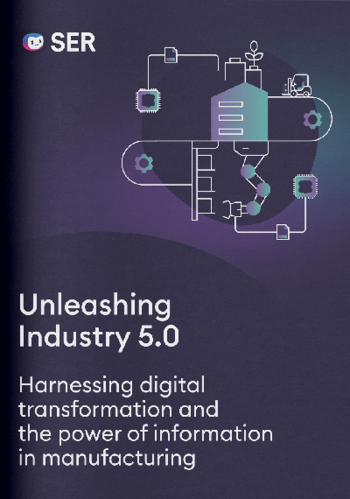
Unleashing Industry 5.0 in Manufacturing
This paper reveals how leaders are harnessing digital transformation and the power of information in manufacturing.
Read nowExamples of AI in industry
Hey Doxi, what are examples for AI in industry?
When artificial intelligence is integrated in all of your processes, production changes completely – how you manage your resources, what average productivity looks like on a work day, and the way systems and components communicate with each other.
Virtual production planning
AI can show you what the production facilities of the future will look like, for example, if you use AI for planning activities. The AI program then creates virtual models of production processes for you. You test these models by instructing the AI program to run through different scenarios.
The AI also takes over production management while operations are running. It can also keep an eye on supply chains and dynamic market conditions: for example, it optimizes the flow of materials between production sites and adjusts processes to prevent material bottlenecks.
Human-technology integration
AI serves as a personal assistant for production workers. When they ask the AI program a question, it provides only the information relevant to the solution.
Ideally, it carries out partial steps automatically – for example, when monitoring the process variables for equipment. In this way, AI can help to solve unforeseen problems such as an error in a system. It also reduces unpleasant routine activities for production workers and accelerates the transfer of knowledge.
Pick-and-place robotics
Robots have been taking over repetitive tasks in production for some time now. These tasks include sorting, assembling, or installing parts. Pick-and-place robots are collaborative, meaning they communicate with other equipment across processes. This makes them extremely versatile: their level of autonomy is so high that they can improve themselves thanks to machine learning or optimize the production status of an entire system. They also respond quickly to new instructions.
This can have major benefits for a business: pick-and-place robots increase production capacities per square meter, shorten process times, and reduce errors. You can use AI applications like this primarily in small-scale production.
Autonomous factories
In the future, automation could go so far that systems in factories operate completely autonomously. Robots would perform every step from start to finish – procuring materials and delivering the finished products to the buyer. Decisions in the manufacturing industry would also be made by systems autonomously in the process: This would enable systems to respond flexibly to changes and independently adapt production processes. In this scenario, people would only monitor factories from a screen in an office.
How AI systems such as Doxi accelerate work processes
Every production activity is connected to administrative processes. Before a material arrives at the production warehouse, it has to first be ordered. Doxi, our artificial intelligence program, serves as an Intelligent Content Assistant to support your business in precisely such document processes.
Intelligent Content Assistant
Chat with Doxi, your Intelligent Content Assistant, directly in Doxis or in individual documents – whether Word document, PowerPoint presentation, Excel spreadsheet, Outlook file, or a PDF. Doxi can answer all of your document-specific questions. For example, for a contract, Doxi can tell you who the contract party is, what the total amount of the quote is, and when the notice period expires.
Doxi also supports you operationally, and
-
summarizes documents in your preferred language,
-
translates documents or information, and provides them in the language requested,
-
suggests document-related actions in the workflow, and carries these out,
-
searches for information,
-
opens context-related documents on request,
- compares data by linking it with Doxis.
Support across the entire document workflow
Doxi also compares data throughout the entire document process. For example, if a regular customer has attached a document to the email, Doxi detects the customer. Doxi then suggests that you store the document in the digital customer file. If it is an invoice, Doxi also launches the relevant invoice workflow – but only if you are authorized to do so as a user.
Because Doxi always applies your access rights as a user. So if you do not have authorization to request salary statements from employees or to query material inventories, Doxi will not comply with your request.
AI in ECM systems
For industry, the AI program Doxi is especially exciting because it makes dark data usable. This automates the end-to-end transfer of knowledge. For this to occur, all the information in the business has to be stored in a structured manner in the enterprise content management (ECM) system. This information is then usable and Doxi can leverage it to automate processes. This impacts production directly.
For example, Doxi reduces storage costs and speeds up production times by enabling just-in-time procurement. For knowledge workers, the workload is reduced enormously by using Doxi as an assistant. At the same time, automated processes increase productivity in production – during ongoing operations, of course.
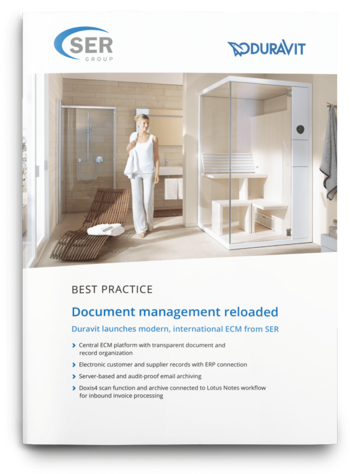
Duravit: Keeping track of customers & suppliers worldwide
Multilingual, transparent, fast and customer-centric: For Duravit, adhering to these principles is easy at all locations thanks to the Doxis4 ECM platform.
Read nowSummary: Visionary control of production processes with AI technology
Industrial companies know about the opportunities offered by AI in production. However, they are not yet fully exploiting AI’s potential, or they may be holding back entirely. Digitalization is necessary to provide data in such a way that AI can process it. Then all production processes can be optimized using AI. The automated knowledge transfer, in turn, ensures that AI systems such as Doxi take over entire work steps for you and assist you in your work.
The latest digitization trends, laws and guidelines, and helpful tips straight to your inbox: Subscribe to our newsletter.
How can we help you?
+49 (0) 30 498582-0Your message has reached us!
We appreciate your interest and will get back to you shortly.

